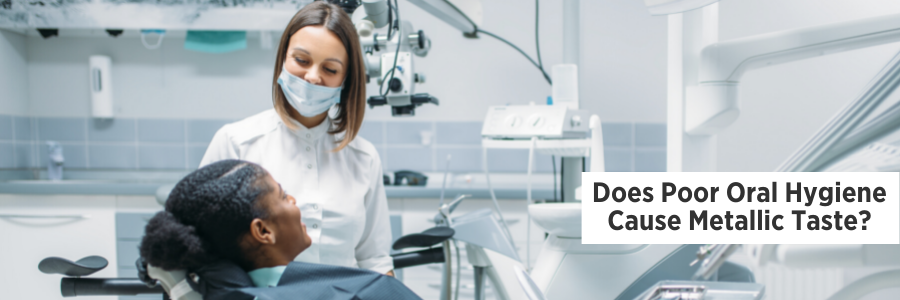


I have been a registered dental hygienist for over a decade. I’ve had the pleasure of working with amazing patients and educating them on their oral health throughout my career. Recently, I made the conscious decision to branch out within the dental field, choosing to maintain my dental hygiene license, and become a dental educator. With a passion for oral and systemic health, I have seen clinically the direct impact systemic health can have on oral health. I will be extending my knowledge outside of the dental chair into the world and make an impact on the lives of others. Learn more about Sara, here.
I have been a registered dental hygienist for over a decade. With a passion for oral and systemic health, I have seen clinically the direct impact systemic health can have on oral health. I will be extending my knowledge outside of the dental chair into the world and make an impact on the lives of others. Learn more about Sara, here.
Metallic taste is a taste disorder medically known as dysgeusia. It is an abnormal or impaired sense of taste, or an unpleasant alteration of taste sensation. Dysgeusia is usually described as a persistent metallic, sour, bitter or other unusual, bad taste in the mouth. Moreover, dysgeusia can be caused by a variety of different conditions including:
Although some of these conditions may seem to be more serious, there is one simple cause of metallic taste that is preventable, poor oral hygiene.
Poor oral hygiene can present itself in a number of different ways. The most common signs are:
Behaviors like not brushing your teeth twice (or more) a day, skipping flossing, and eating sugary/acidic foods throughout the day may create problems for your oral health.
Poor Oral hygiene increases plaque and bacteria accumulation in the mouth. If not effectively removed, the bacteria will proliferate, and increase the risk for infections in the mouth. In addition, this bacterium may cause bad breath as well. The bacteria sitting on the tongue may alter the taste bud receptors on the tongue, which will ultimately alter the taste of foods and beverages.
Consistent poor oral hygiene habits may eventually lead to inflammatory diseases and infections in the mouth starting with Gingivitis. Unfortunately, it may further migrate into a chronic infection called Periodontal Disease.
Furthermore, poor oral hygiene may lead to dry mouth symptoms. Plaque and bacteria in the mouth are treated as foreign microorganisms, which are invading the oral cavity. This will cause a proinflammatory response in the mouth that will alter the function of the salivary glands. Ultimately, decreasing the production of saliva. This lack of production of saliva may lead to dry mouth symptoms and oral discomfort.
All in all, maintaining good oral hygiene is something we can all incorporate into our daily lives. A simple routine of brushing 2 times per day, flossing daily and following a nutritional diet will promote good oral health. This may decrease the risk for oral infections, bad breath, and altered or metallic taste. Be proactive and not reactive with your oral health!

Unfortunately, metallic taste can decrease your overall health and even your quality of life due to changes in nutrition. With metallic taste, even your most favorite foods can taste unpleasant, possibly leading to poor nutritional choices. Since metallic taste causes an aversion to certain foods, people tend to eat less or make poor nutrition choices.
To mask the unpleasant taste caused by dysgeusia, people often choose to eat spicier, saltier, or overly sweet foods. As a result, sodium and sugar intake will often increase. These changes may lead to health complications or cause additional health problems.
One study showed that some dysgeusia patients began drinking an excessive amount of water. This creates a higher risk for polyuria (production of large volumes of urine), incontinence, and falls for the elderly.
For example, here are some simple things to incorporate into your oral care routine:
Most importantly, if you need further assistance determining a plan of action for your oral health, it’s important to speak with a dentist for their recommendations.
MetaQil is an innovative mouth rinse designed to provide comfort to those who suffer from taste disorders. In fact, our unique sugar-free, alcohol-free formula includes xylitol, a low calorie and low glycemic index sweetener.
Also, our formula also contains monk fruit extract. Monk fruit extract contains anti-inflammatory properties to prevent oral diseases in the mouth. As well as add a natural, antioxidant-sweetening agent.
However, once the underlying cause of metallic taste has been addressed, metallic taste symptoms tend to pass and dissipate. However, it is always important to speak with a health professional if metallic taste becomes a consistent issue.
Overall, it is crucial to maintain optimal oral health to prevent oral diseases and infections in general, but this can prevent metallic taste as well. Above all, your oral care routine is something you can control, so do your best while working towards better oral health!
MetaQil is the #1 solution for symptomatic relief of metallic taste. MetaQil’s scientifically designed formula alleviates metallic taste caused by chemotherapy, GERD, and a variety of medications.
MetaQil gently cools the mouth and provides instant, long-lasting relief from metallic taste symptoms. It has a mild flavor and does not “sting” the mouth like an every-day mouthwash. Regular use of MetaQil can help patients return to healthy eating and adequate nutrient intake.
For best results, use approximately 5 ml (one teaspoon) of MetaQil®, rinse for 30 seconds, and spit out. MetaQil can be used on an as-needed basis. Use alone or after each time you brush your teeth
Important: If you are pregnant or breastfeeding, please consult your physician before using MetaQil. Do not use MetaQil if you are taking any medications that are contraindicated with the product. Please consult with your physician if you have any concerns regarding the use of this product. Keep out of reach of children.
For more information about MetaQil, click here.